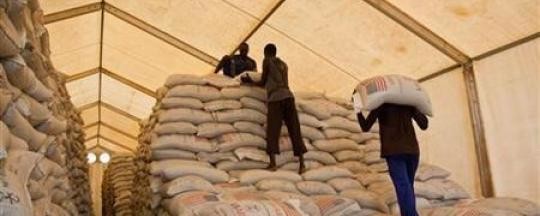Humanitarian aid has reduced the severity of South Sudan’s hunger crisis, pulling back 11 counties from the brink of famine, a new report shows.
The Integrated Food Security Phase Classification (IPC) released a report Wednesday showing South Sudan faces the worst hunger since independence, with 4.6 million people in crisis or emergency food insecurity, roughly 40% of the population.
Still, the IPC report, which was produced by national and international experts and endorsed by the Juba government, points out that the hunger situation would now be even worse if not for aid delivered by humanitarian NGOs.
According to the report, 11 counties in Lakes, Jonglei, and Unity states, as well as four Protection of Civilians sites on UNMISS bases, were classified as Level 3 “crisis” instead of Level 4 “emergency” thanks to intervention by humanitarian NGOs who delivered aid to the areas. Level 4 “emergency” is the last stage before famine.
“Humanitarian aid is working – the report shows that if not for humanitarian assistance, fifteen locations of the country would have been classified as being in an ‘emergency’ food situation,” said Zlatko Gegic, country director for international NGO Oxfam. “However, fighting and the coming rains will make it even harder for people to access life-saving assistance, further worsening an already dire food crisis.”
The counties labeled as “crisis” instead of “emergency” are: Minkaman, Twic East, Duk, Ayod, Uror, Akobo, Panyijiar, Mayendit, Koch, Guit, and Rubkona. The Protection of Civilians sites also labeled as Level 3 are in Bentiu, Malakal, Bor, and Juba. However, the latest IPC report does not take into account the effects of the last month of fighting in Unity, Jonglei, and Upper Nile states, which has displaced over 100,000 civilians.
Aid workers cite increasing restrictions on their work lately, including having to evacuate areas due to fighting. Meanwhile, armed groups controlling Bentiu and Rubkona have prevented humanitarians from reaching areas where civilians have been in need of help.
A summary of the report is available for download below.
Related:
Red Cross supplies in Leer looted, citizens hungry (25 May)
South Sudan parliament cuts number of allowed foreign aid workers (12 May)
Unity fighting leaves 300,000 S Sudanese citizens without food or medical aid (11 May)
Aid workers evacuate Leer fearing “imminent attack” (9 May)
Aid workers ‘prevented’ from leaving UN base in Bentiu (5 May)
S Sudan asks NGOs to fire foreign aid workers amid hunger crisis (15 Sep.)




